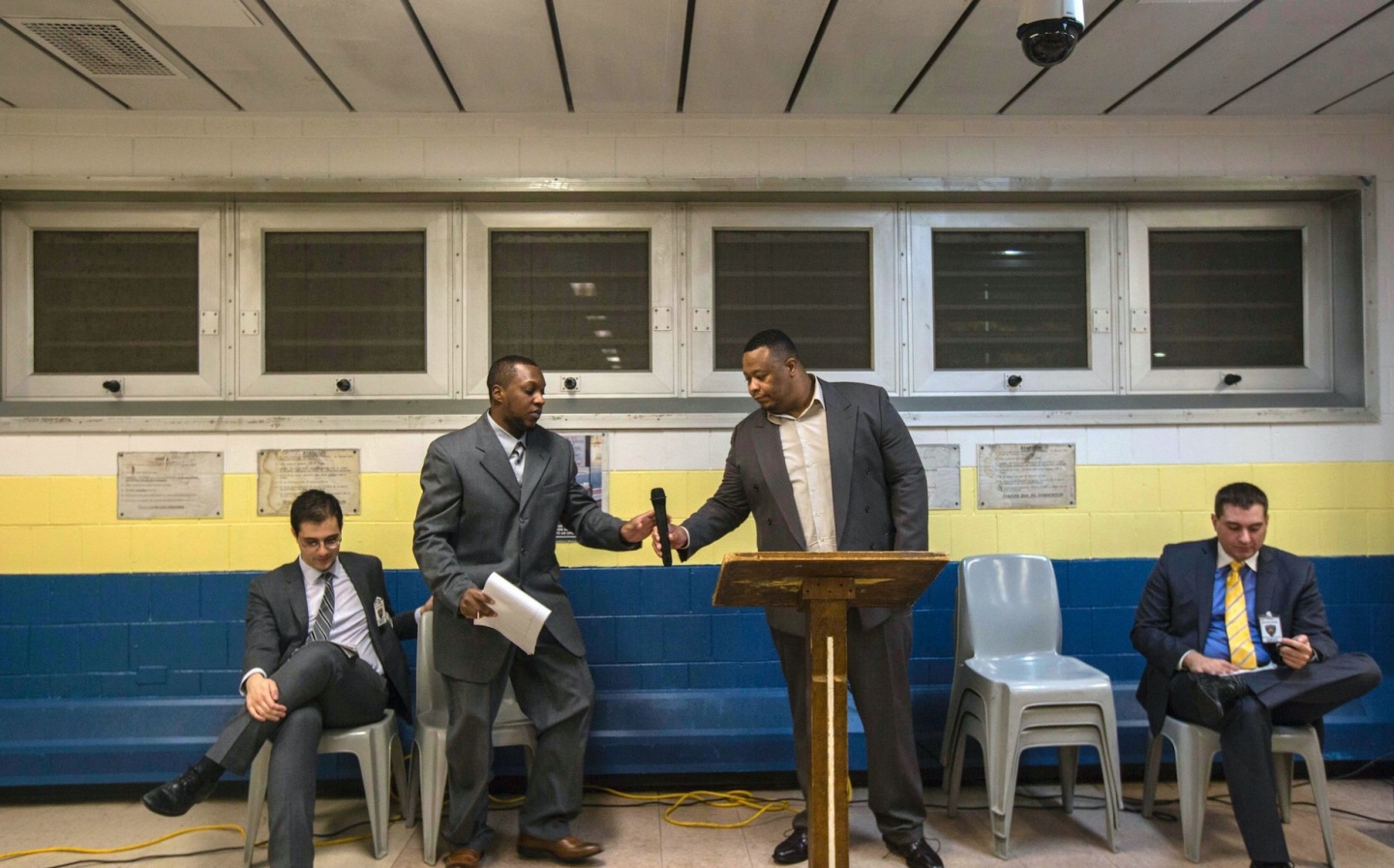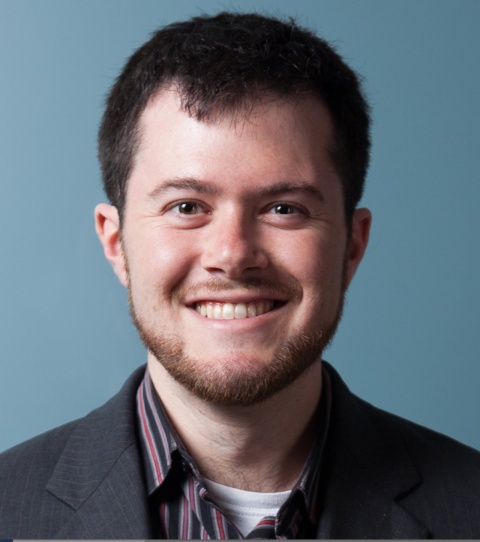Joshua Morrison ’07 brings his College experience to the Rikers Debate Project.
Columbia College | Columbia University in the City of New York
Joshua Morrison ’07 brings his College experience to the Rikers Debate Project.

A debate at the Rikers Island jail complex in 2016.
Hiroko Masuike / The New York Times / Redux
When Joshua Morrison ’07 walked into Rikers Island for the first time, to teach debate to inmates, he was immediately struck by the powerlessness he sensed in his students.
“It’s very clear, in a visceral sort of way, that I have options that they don’t,” Morrison says, recalling the fear that seemed common to most everyone he encountered. “I just pictured spending every waking minute there.”

Joshua Morrison ’07
Once Morrison and his students begin arguing for or against these topics, using the same techniques he learned as a student on the Columbia Debate Society, he sees a confidence begin to surface. “In the classes, you get over the fact that they’re in detainee’s uniforms very quickly. And then they’re just students,” he says.
Morrison, a suburban-Boston native, leaned on his experiences debating at the College when he formed the Rikers project. “A lot of my social life was thanks to meeting people in debate,” he says of his time on the squad. College debate also introduced him to the thrill of winning an argument, something he thought would fuel a career in litigation. After graduating from Harvard Law School in 2010, Morrison became a corporate law attorney with the New York City firm Ropes & Gray. But despite the paycheck and the prestige, he wasn’t happy. Grasping for more of a sense of purpose, in 2011, he donated a kidney to a stranger — something he’d wanted to do since reading about the difficulties faced by potential recipients on organ waitlists. Morrison’s reason for donation came down to a core belief that has guided his nonprofit work during the past six years: “I grew up really privileged. I felt like I needed to do something valuable.”
Morrison soon quit his law gig and became a full-time advocate for kidney donation, founding the nonprofit Waitlist Zero, which aims to increase the number of living kidney donors. It was just the start of his career in activism. In 2016, a buddy mentioned an event his company was putting on at Rikers: a one-time-only debate between Columbia College students and some inmates, inspired by similar programs at other prisons. Morrison was asked to be a judge. During a debate on the elimination of plea bargains, Morrison was particularly struck by the arguments of inmate Jack Moussignac.
“Jack was clearly the best debater in the round, despite having no training,” Morrison says. “I saw the potential of the idea [for Rikers Debate Project] because of how good a debater Jack was.”
Morrison wanted to teach inmates the philosophy behind debate, and to empower them and give them the skills to articulate their experiences. “I could see the idea of using debate as a way of promoting the voices of people who are incarcerated,” he says. “Criminal justice reform in the U.S. is an important cause.”
By July 2016, Morrison had enlisted friends and classmates as volunteers who would take the two-plus-hour bus ride once a week from lower Manhattan to Rikers — one of the world’s largest correctional facilities, and one with a notoriously violent history. The logistics of getting into the facility were often the most challenging part, Morrison says. Transportation was frequently late, receptionists didn’t know who they were and programmatic red tape threatened what little time they had with the inmates.
The 12-week curriculum covers the basics of debate and argument, speaking with confidence, and cross-examination. Exercises range from simple tongue twisters to debate demonstrations. The lesson that typically has the most impact is how to argue against what you believe, says Caitlin Halpern ’09, who joined the Rikers Debate Project about nine months into its founding and is now its acting executive director. (Neither Halpern nor Morrison are paid, and are supported by individual donors.)
“People have such strong views, especially on something like bail reform, which has really touched our students’ lives,” she says. “It’s challenging to see the opposing view, but they do, and they get it.”
Inmates often pull from events in their own lives to make compelling arguments. Camilla Broderick joined the Rikers debate team in 2016, after being an inmate in the Rose M. Singer Center for one year. On topics such as whether the facility should be closed, she included in her argument details that no newspaper or textbook could provide. “I was on suicide watch originally, and the conditions in the psychiatric ward were awful,” Broderick says. “I think my ability to describe the conditions prompts a very visceral reaction from people. They likely know that it’s bad, but don’t really understand how bad until you paint them a picture.”
Today, the Rikers Debate Project comprises more than 250 volunteer teachers in almost a dozen states, working in jails and prisons in New York, Connecticut, New Jersey, Maryland, Louisiana and Texas. The program has had an effect both inside the jails and as student inmates are released. One former student used a debate tactic, the “A.R.E.” format — assertion, reasoning and evidence — to nail a job interview. Others use the program to advance their careers; the organization has a paid fellowship program for students, including Broderick. She now attends the CUNY John Jay College of Criminal Justice and was a Justice-in-Education scholar at The Center for Justice at Columbia.
But some of the impact is more nuanced, Morrison says. In a letter to fellow inmates, former student Moussignac wrote that the teachers, including Morrison, helped them focus their energy on something positive, both in their future professional lives and in moments of feeling less-than.
“They remember your names,” he wrote of the organization’s volunteers. “[They] treat you like a person who deserves respect.”
When Morrison read the letter, he was moved to tears. “It’s one of those things where the teacher learns more from the student,” he says. “It’s really an honor to get to know these people and see these beautiful minds at work in a very inhospitable environment.”
Lauren Steussy is an editor and writer at the New York Post; her work has also appeared in Marie Claire, Cosmopolitan, The Orange County Register, San Diego Magazine and more. Her last profile for CCT was of CNN anchor Poppy Harlow ’05.

Published three times a year by Columbia College for alumni, students, faculty, parents and friends.
Columbia Alumni Center
622 W. 113th St., MC 4530, 6th Fl.
New York, NY 10025
212-851-7852
cct@columbia.edu

Columbia Alumni Center
622 W. 113th St., MC 4530, 4th Fl.
New York, NY 10025
212-851-7488
ccalumni@columbia.edu